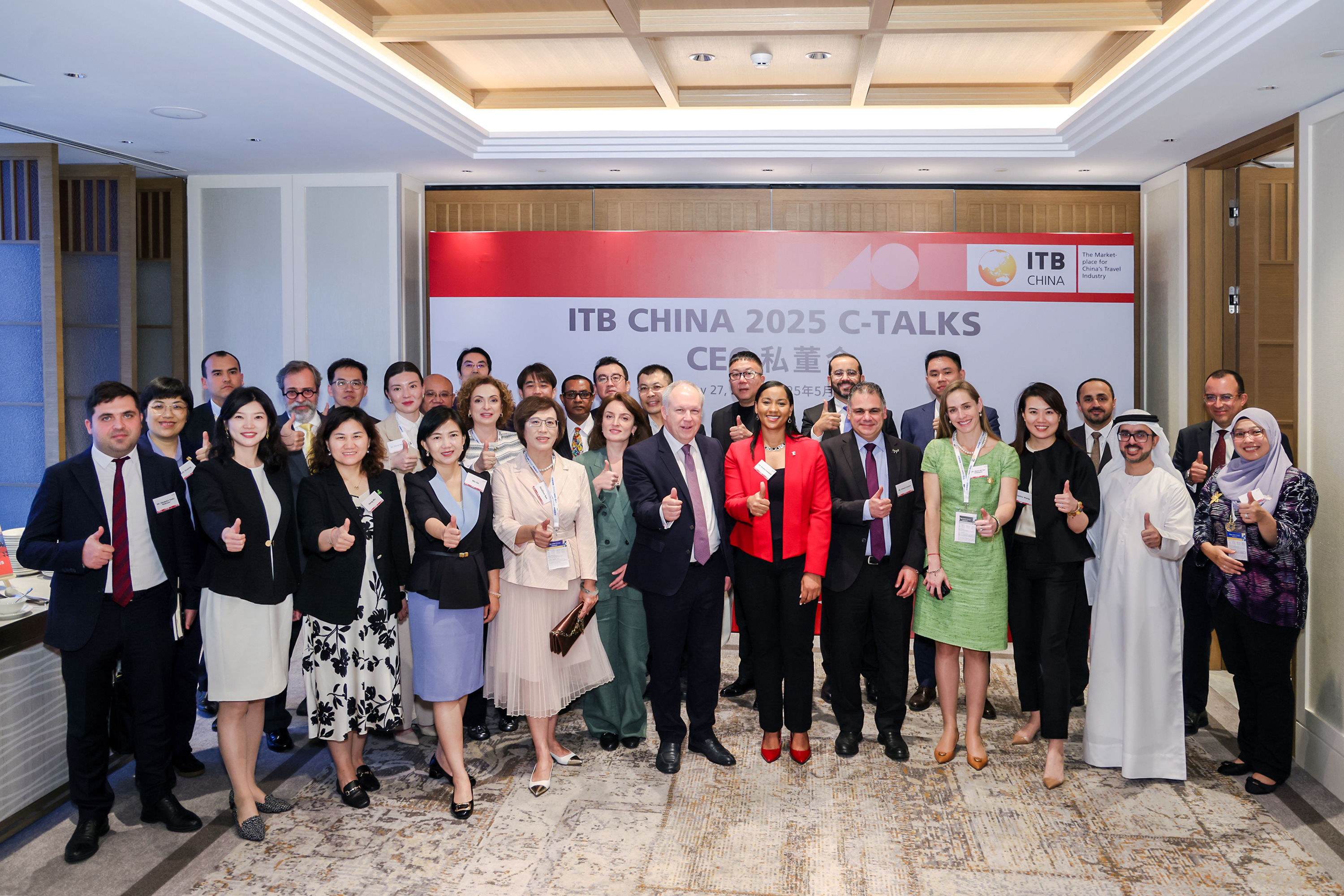ITB China 2025: high-level participation
ITB China 2025 C-Talks Gathered Over 30 Senior C-level Executives to Shape the Future of Tourism
On the opening day of ITB China 2025, more than 30 high-ranking executives from China’s leading outbound travel companies and senior representatives from national tourism boards and ministries gathered at the exclusive closed-door C-Talks round table, addressing key topics of the Chinese and global travel industry.
Organized by ITB China, the C-Talks set the stage for a high-impact gathering at the Qiantan Shangri-La Pudong Hotel in Shanghai. The exclusive round table united C-level executives from China’s key outbound travel companies – such as Spring Tour, Grand China MICE, Fliggy, GZL International, HHtravel, HCG TRAVEL GROUP, HUAWEI Consumer Cloud Service, CAISSA, China Comfort Tourism Group, Tencent Smart Tourism, Tuniu.com, Rednote, Bravolinks, China Association of Travel Services(CATS), and UTour, with senior officials from 16 national tourism boards and ministries representing Abu Dhabi, Egypt, Ethiopia, Georgia, Kazakhstan, Kyrgyz Republic, Malaysia, Morocco, Nicaragua, Portugal, Peru, Qatar, Serbia, and Türkiye.
In a strategic dialogue, they discussed redefining Chinese outbound travel, navigating global uncertainties, engaging a new generation of Chinese travelers, and leveraging the transformative power of Extended Reality (XR) and Artificial Intelligence (AI) to drive growth and innovation in the global tourism industry.
Topic 1: Turning Uncertainty into Opportunity: Rethinking Global Travel Strategies in a Rapidly Changing World
With currency fluctuations, global challenges, and safety concerns continuing to influence destination choices and shifting travel behavior, participants explored new approaches to resilience, agility, and cooperation under the theme “Turning Uncertainty into Opportunity: Rethinking Global Travel Strategies in a Rapidly Changing World.” Participants emphasized that China’s outbound tourism market is undergoing a structural transformation marked by the new trend of “stable volume, upgraded quality.” Travelers of different ages now have different preferences. Some seek premium services and immersive experiences, while others are drawn to destinations that are popular on social media. This evolving and varied demand fuels the development of a multi-tiered, specialized tourism product ecosystem. While in the MICE sector, destinations along the Belt and Road routes, and emerging markets, such as Saudi Arabia and other Middle Eastern countries, are gaining traction. Business travelers are placing increasing value on cultural exchange and enriched, experience-driven itineraries as part of their trips.
Topic 2: Redefining the Market: China’s Changing Traveler Profiles
Under the title “Redefining the Market: China’s Changing Traveler Profiles,” attention turned to China's rapidly evolving outbound market. The participants observed a clear shift in the travel habits of Chinese tourists, and pointed out that younger generations, especially those born after 1995 and 2000, are turning to platforms such as Rednote for inspiration before they travel, placing greater value on emotional connection and immersive experiences. Meanwhile, older travelers – thanks to more flexible time and financial resources, opting for niche, long-haul, and slow-paced trips. Overall, there’s a move from simply “seeing the world” to truly “feeling the world” with a growing focus on cultural resonance, personal expression, and meaningful engagement with local communities and sustainability. This shift is prompting tourism businesses and destinations to rethink how they design and market experiences, putting users, storytelling, and cultural relevance at the forefront.
Topic 3: Transforming Travel: The Impact of XR and AI on the Future of Tourism
The final session, “Transforming Travel: The Impact of XR and AI on the Future of Tourism,” explored how cutting-edge technologies are revolutionizing the travel industry. The participants highlighted the vital role of XR and AI in destination marketing, personalized travel planning, and enhancing tourist experience. These technologies enrich journeys, improve visitor flow, and help ease overtourism. As competition grows, digital transformation is emerging as a key growth driver. XR is shifting from pre-trip inspiration to immersive on-site experiences, deepening cultural understanding through digital reconstruction and interactivity. AI supports personalized, end-to-end services with content generation, multilingual avatars, and smart recommendations, greatly enhancing travel for international visitors.
Another publications
Personal experience and game mechanics: MGMC announced the leading trends in the MICE industry
Personalization and gamification — strategic tools of the MICE industry — have become the new standard for organizing business events. Experts believe that in 2026, these trends must be taken into account when creating MICE events.
The Experience Economy in MICE: How to Monetise Client Emotions?
The experience economy is a trend focused on selling emotions and delivering unique experiences. In a highly competitive environment, customers of the MICE industry want more than just a high-quality event; they want meaningful experiences and personal involvement.
The 2025 Meet Global MICE Congress has drawn two times more participants
The international congress has confirmed Moscow’s status as a world-renowned center of excellence in the field of business tourism, having brough together professionals from 37 countries of the BRICS and the Global South.
Previous publications
Astro tourism and stargazing in Dubai
According to Skyscanner, one of the big travel trends for 2025 is ‘astro adventures’, and Dubai offers some out-of-this-world experiences. Visitors can go stargazing on a desert safari and in the mountains in Hatta, or attend a session with Dubai Astronomy Group.
Dreams of a cruise with SWAN HELLENIC
"Discover the inaccessible to others". This slogan of the company implies that there is something far away for others that you can discover for yourself. And we, the organizers of events, can interpret it like this: let's open up what is inaccessible to our customers!
QATAR TRAVEL MART 2024 Set to break records with expanded scope and participation
Scheduled for November 25-27 at the Doha Exhibition and Convention Center (DECC), this year's event is set to surpass all expectations. The highly anticipated third edition of QTM is organized by NeXTfairs for Exhibitions and Conference.


